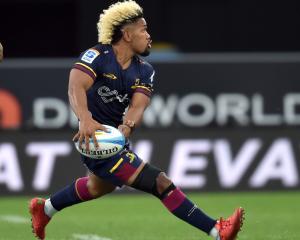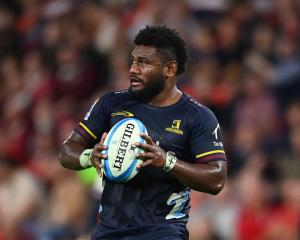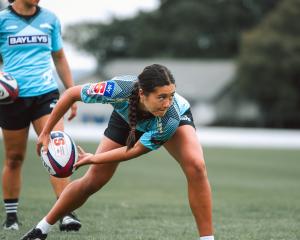After a disappointing World Cup campaign, new Samoa coach Alama Ieremia recognises the enormity of the job ahead. Patrick McKendry caught up with the former All Black in Apia getting to grips with his new role.
It is the end of Alama Ieremia's first week in Apia in his new role as Manu Samoa's head coach.
The next day, to mitigate against the heat, two Samoan development teams will play a match which kicks off at 9.30am. Watching it will be one of Ieremia's first official engagements as he starts the long road to getting the game in this country back where he believes it should be.
Manu Samoa were desperately disappointing at the recent World Cup, finishing fourth in their pool after losing to Japan, South Africa and Scotland. Their sole victory was against the United States, a 25-16 win in Brighton which did little to impress their supporters around the world who expected better things from a team that pushed the All Blacks all the way in their historic test in Apia in July and made World Cup quarter-finals in 1991 and 1995.
After finishing last year's World Cup with a 36-33 loss to Scotland in Newcastle, a thriller in which Manu Samoa at least rediscovered their attacking spark, they must qualify for the next one in Japan in 2019.
Ieremia, a former assistant who replaced Stephen Betham as head coach, has no time to waste.
Speaking over the hum of the air conditioning unit in his small office in Tuanaimato on the outskirts of Apia, former All Black midfielder Ieremia says: "Samoan rugby is at the crossroads, really. For me, going through the lessons [of the World Cup], some of them were really tough ... but the new direction is something I'm really excited about. There are a lot of good people here now and we all know what needs to happen.
"We were gutted ourselves, as a team," he says of the World Cup flop.
"We had high expectations and we thought we had a good preparation - a relatively good Pacific Nations Cup - and we went to the World Cup and came unstuck. Looking back, the first 40 minutes against Japan pretty much killed us. We saved our worst performance for many years and gave it in one half. I think we gave away 14 penalties, plus two yellow cards, and at halftime, we were 20 points behind. Japan had the momentum and when you offer them 20 points ... it just went downhill from there.
"The boys came back in the Scotland game. We were playing for pride and I suppose we had the freedom to express what we're all about and it came out in that last game. But it was too late, way too late. There were massive lessons to come out in that campaign. Some of those are in-house that we need to address as a union and as a team.
"For me, it was tough. I was part of that campaign and some people may be questioning why I'm going through that again but I see the future of Samoan rugby in a different state, a positive state. Even leading into that All Black test, there was a feeling of change at the administration and management level. Our role as a team was to match that and unfortunately we didn't.
"There's an old saying - 'when it rains, you've got to deal with the mud' - and unfortunately that was the case for us."
The Samoan Rugby Union has a relatively new chief executive in Faleomavaega Vincent Fepulea'i, who was working on an interim basis in July when the union and country hosted the All Blacks in a hugely successful test. Brian Hopley, a New Zealander who is a former high performance manager at the Southland Rugby Union, is the general manager of rugby, effectively Ieremia's boss.
There are other new faces in the union's high performance unit, a single storey building with a corrugated iron roof adjacent to a training field and gym, which is leading to a freshness and feeling of solidarity which Ieremia believes will lift Samoan rugby out of the doldrums.
As Ieremia says, change is badly needed because a country with enormous natural talent has slipped to 15th on the world rankings behind fellow Tier Two nations Japan (10th), Fiji (11th), Tonga (13th) and Georgia (14th). One of his first tasks is to improve the level of communication through all levels of the game here.
The challenge of co-ordinating players based in Europe will probably never change for Samoan rugby. But it is one which Ieremia believes can be managed better, and besides, other Tier Two nations are managing it more effectively.
"That's the reality of how we have to work," he says. "But if we want to be competitive, that's a key area we have to address and not shy away from. We've got to look at the way we improve our communications with the players overseas and how we attract them back to play for the blue jersey.
"After our failure at the World Cup, we have issues we have to address with our players to make sure things are looking brighter. We're always going to have that as a barrier if you like - having over 90 per cent of your team overseas - but we're hoping that within our development structures and partnerships with stakeholders overseas, that we can keep a hold of or track our players better so when they do play for Samoa, they understand what they're here for.
"I look at the example of [Kiwis league coach] Steve Kearney and the way he's transformed the team. It's similar, the way he's bringing a whole bunch of players together. Obviously we're miles apart in terms of resources, but the basic principles are similar and could help us, because if we don't move with the times, we will suffer and we will probably lose a lot of credibility around the world. In many cases, other Tier Two countries around the world are doing a lot better than us."
Ieremia, a former Hurricanes player and assistant coach, has signed a four-year contract with the SRU through to the end of the World Cup in Japan, a country which holds good memories for the now 45-year-old who coached at Suntory in the mid-2000s.
"I started my family in Japan and I still have a lot of friends there. I still have connections with the club I was at. I'm keen to get there ... but we have to qualify first to get to the World Cup. That is my main goal. We have to qualify early in the piece and then we can start planning."
Landing in Apia at the start of the week, Ieremia, who had been begun work in his new role in New Zealand, admitted to feeling some trepidation before arriving in the country of his birth. Rugby is dear to many people here and he was expecting the possibility of a backlash.
"I knew that could be a reality but the passion to move the whole thing forward was something that was driving me. As you can see, my office isn't completely set up yet, but we'll get there."











